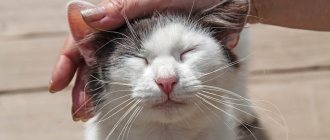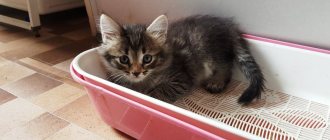Why does a cat meow?
A cat's vocal functions play a significant role in its life. With the help of sounds, an animal can tell its owner about desires, fear, grief, danger, and the appearance of pain in the body. The intonation of a cat, the strength of sounds, the movements accompanying its “speech” activity are understandable for a person who has lived with a pet for more than one year. The cat uses its voice to achieve goals :
- asks for food, water;
- invites the owner to let her out into the street or let her back in;
- desires affection;
- reports that something hurts her;
- signals that she is ready for procreation;
- warns that she is angry or scared.
© shutterstock
Sometimes the usual communication between a person and an animal becomes impossible - the cat’s voice disappears. This phenomenon may indicate the development of dangerous diseases and emergency situations and requires seeking veterinary help.
Diagnostics
At the appointment, the doctor may examine the animal’s throat.
If your cat becomes hoarse, breathes with its tongue hanging out, and sneezes frequently, then you should immediately contact a veterinary clinic. Such symptoms indicate serious illnesses in the respiratory and other systems of the cat’s body. During diagnosis, a specialist uses special instruments to examine the animal’s throat to detect a foreign object, which most often leads to wheezing. The veterinarian asks the animal owner what other symptoms have been present and for how long. If the cat begins to breathe heavily in its stomach, wheeze and cough, then to make an accurate diagnosis and find out the cause of the problem, the following diagnostic procedures are performed:
- laboratory testing of blood and urine;
- analysis of feces for the presence of helminths;
- biopsy of damaged tissue;
- ultrasound diagnostics;
- radiography.
Colds, infections, viruses
A cat, like a person, is susceptible to colds; it can be attacked by numerous infections and viruses. The main route of transmission of such ailments is airborne; often the disease occurs in an animal due to its long stay in unfavorable weather conditions, from hypothermia or exposure to a draft.
A cat will not be able to meow fully if he has signs of illness.:
- Otitis or inflammation of the ear - the development of a pathological process in the animal’s ear is accompanied by severe pain, it can affect the larynx, where the animal’s speech apparatus is located, which makes it much more difficult for it to reproduce sounds;
- Sore throat, when the disease occurs, characteristic signs arise - the animal’s voice begins to disappear; if you open its mouth and examine it, swelling and inflammation of the mucous membranes, the presence of a sufficient amount of mucus covering the vocal cords will be noticeable;
- Rhinotracheitis, signs that can be suspected are discharge from the eyes and nose, first serous, then mucous, purulent; the cause of its development is infection with feline herpesvirus type 1;
- Calicivirus is a viral pathology in which ulcers of a watery structure appear on the pet’s larynx and tongue, the process is accompanied by severe pain, the animal loses the ability to swallow food and make sounds.
The cat becomes lethargic, may open its mouth silently, refuse to eat for several days, its nose may become dry - such symptoms are a reason for an urgent visit to the veterinary clinic, examination of the animal, and prescription of medications.
© shutterstock
Causes of voice loss
If a cat has “lost” its voice, has stopped meowing, and wheezing is clearly audible, the reasons may have a wide variety of etiologies and pathogenesis. Moreover, some of them do not pose a serious danger to the health of your beloved pet and treatment can be carried out at home, while others, on the contrary, may indicate the development of serious systemic, functional pathologies and require an integrated approach to treatment.
In order to choose the right treatment therapy and provide assistance to the animal, it is very important to establish the root cause of such a problem, which is only possible after undergoing a comprehensive diagnosis at a veterinary hospital.
Causes of voice loss in cats:
- entry of a foreign object into the larynx or trachea;
- viral, bacterial infections, diseases;
- helminthiases;
- insect bites;
- respiratory, colds;
- severe hypothermia;
- poisoning by toxic fumes;
- dehydration, intoxication of the body;
- stressful situations.
The voice of cats can disappear due to developing sore throat, otitis media, influenza, bronchopneumonia, or rhinotracheitis. Loss of vocal function in cats is almost always noted with calcivirosis, a highly contagious disease of viral etiology. With this disease, inflammatory processes are localized in the tissues of the larynx and pharynx. Small ulcers form on the mucous membranes of the nasopharynx and oral cavity. Lymph nodes and tonsils are affected.
Important! Rabies and Aujeszky's disease can lead to complete loss of vocal functions in domestic animals and muteness, since deadly infections affect the central nervous system and other body systems.
A pet may stop meowing after suffering from a sore throat, which can provoke the development of viral laryngitis, in which the laryngeal mucosa is severely inflamed. In addition, swelling of the pharynx and enlargement of regional lymph nodes are noted. A large amount of mucus accumulates in the area of the vocal cords, which interferes with the normal reproduction of vocal sounds.
Very often cats lose their voice due to otitis media. The disease is accompanied by inflammation of the middle, outer or inner ear. Depending on the intensity of pathological processes, etiology, and form of the disease, loss of voice in cats can be short-term or, conversely, animals cannot meow for a long time even after complete recovery.
A cat may lose its voice after surgical operations, since after recovery from anesthesia the animals are greatly weakened and it takes time to restore a normal state.
It should also be noted that if a cat becomes hoarse and there is a loss of vocal functions, then this can be caused by poisoning with potent poisons that provoke a spasm of the larynx. If the air in the rooms is too dry, the owners have the habit of smoking in the apartment, this will not only negatively affect personal health, but also the well-being of their pets. As a rule, if there is smoking in the house, the animals will have a hoarse, hoarse voice.
There can be many reasons for a cat losing its voice, ranging from psychological to the development of serious diseases. Conventionally, they can be divided into two large groups:
- everyday situations;
- pathological conditions.
Loss and change in voice may be due to the physiological characteristics of the structure of the vocal cords in a particular cat, but in this case the problem will be present constantly and will not arise suddenly.
When an animal loses its voice, you need to evaluate the conditions of the surrounding space and understand whether something could cause such a reaction. The owner’s actions will completely depend on the current situation.
Cats are territorial animals, they get used to their home, mark it with their smell, outlining the domain where they are most comfortable to be. Traveling by car, moving to another home, temporary stay in a pet hotel - all this violates the boundaries of the pet’s comfort and puts it into a state of stress.
You can speed up this process by giving your pet more attention and care. However, if the cat has already come to his senses, is leading a normal life, but still has no voice, then you should go to the clinic - perhaps there are other reasons for this condition.
Severe weakness and stress often accompany surgery, especially if it was performed under general anesthesia. A weakened animal may simply be unable to meow for several days after the experience.
A stressed cat may not speak at all for several days.
Blocking of the pharynx with a foreign object
An object, a piece of food, or a sharp bone getting stuck in a cat's throat is a common reason why she loses her voice or develops severe hoarseness. The situation is complicated by the fact that the animal is not only unable to independently free itself from a foreign body, its fear, desperate, instinctive attempts to remove the object by coughing or vomiting lead to severe trauma to the tissues of the respiratory organs, larynx, and esophagus. The presence of such damage contributes to the development of inflammatory processes and can lead to prolonged absence of voice.
The owner himself can help the pet - after securely fixing the animal with tweezers, you can try to remove the object from the throat. The owner's movements should be as careful as possible. If you are not confident in the safety of independent manipulations, you need to consult a specialist. To prevent the development of a dangerous situation, it is necessary to check the cat’s diet, avoid the presence of bones or larger pieces in the food, and do not leave small household items in the animal’s free access.
Treatment
Foreign objects in a cat's larynx must be removed as soon as possible to prevent them from moving further down the esophagus. The best person to handle this is a veterinarian. Sometimes it is necessary to inject an animal into anesthesia to remove a foreign object. Sometimes it is impossible to do without surgery.
If there is a suspicion that an animal has rabies, it must be immediately isolated from people. It is necessary to protect your hands and body as much as possible in case the cat attacks the owner. When the animal is in a carrier, it must be urgently shown to a doctor. The necessary tests will be taken from the cat, and she will be sent to quarantine. If the diagnosis is not confirmed, the animal will return home in a few days.
Rabies is dangerous for humans. This is why you should not ignore the symptoms of an animal's illness.
To treat infectious diseases, your doctor may prescribe a course of antibiotics. In this case, maintenance medications are prescribed that will help improve the cat’s immunity and also protect the body from the negative effects of antibiotics. To relieve swelling, anti-inflammatory drugs are prescribed. To ensure that the animal can eat, painkillers are prescribed.
You might be interested in: What causes red spots in my cat's ears?
A dehydrated cat should be seen by a doctor immediately. If the animal is severely malnourished, simply giving it water is not enough. To restore the water-salt balance, the animal may have to be given a drip.
If swelling of the throat occurs as a result of an allergic reaction, it is important to find out the exact allergen that caused it. If plants, household chemicals, or some food components are to blame, they must be excluded from direct contact with the animal. The doctor will also prescribe antihistamines that will help alleviate the animal’s condition.
Some diseases are chronic. It is impossible to completely cure them, only to alleviate the animal’s condition during periods of exacerbation. Even when the animal feels better, its health needs to be closely monitored. A decline in immunity can lead to another exacerbation of the disease.
Lack of water
The cause of a condition where a cat has a hoarse voice may be an insufficient amount of water that the animal drinks every day. Dehydration of an animal's body can be expressed by symptoms :
- severe weakness;
- the ability to fully produce sounds is lost;
- increased body temperature;
- complete inability to move.
To prevent the cat from losing his voice for this reason, the owner must ensure that he always has fresh, clean water in his bowl. Many animals have an interesting feature - they refuse to drink from their own, cat's, dishes. Large buckets and pans are chosen by them as the best option. The development of events in this scenario obliges pet owners to regularly update the water in such containers and provide easy access to them.
Other reasons
The answers to the question “why does a cat lose his voice” may be different. This state of the animal can be associated with various prerequisites:
- poisoning by components of products used for disinfestation of premises, household chemicals, construction and finishing materials;
- long stay in a “smoky” room.
The loss of the ability to make sounds in such cases is accompanied by signs of intoxication of the body. The animal has:
- cough;
- the appearance of wheezing;
- vomit.
First aid for a pet in such situations is to quickly provide access to plenty of fresh air and drink more.
A cat may lose its voice after surgery using anesthesia. This condition is explained by the extreme weakness of the animal.
We suggest you familiarize yourself with How an aquarium filter works
Cats are vocal creatures. These animals often express their “opinion” on any subject; some felines are even capable of making sounds similar to the simplest words (and they do not need to be trained for this). If the cat is hoarse, any owner will notice it. Why can this happen, and does this pathology pose a danger to the life and health of your pet?
Rabies
An extremely dangerous disease, rabies, which affects domestic animals, can be the main factor in which a cat loses its voice. assessment of the characteristics of the physical condition and behavior of a pet, which is characterized by :
- the appearance of aggressiveness, inadequacy;
- refusal to eat, drink;
- movements become noticeably inhibited and sluggish;
- cannot swallow food or water;
- muscle cramps develop, then paralysis.
Even cats kept exclusively at home can get rabies, so all animals without exception need regular vaccination. At the first suspicion of illness, you must immediately report the symptoms to the veterinary service.
© shutterstock
Visit to a specialist
The veterinarian will determine exactly why the animal began to show anxiety, and for what reason problems with the speech apparatus arose. In most cases, the problem is solved in a clinical setting, where the necessary equipment and tools are available. The specialist is able to do everything possible to normalize the pet’s condition. The owner needs to listen carefully to all the recommendations, confirm the symptoms and be able to help the cat afterwards at home.
Help in hospital











